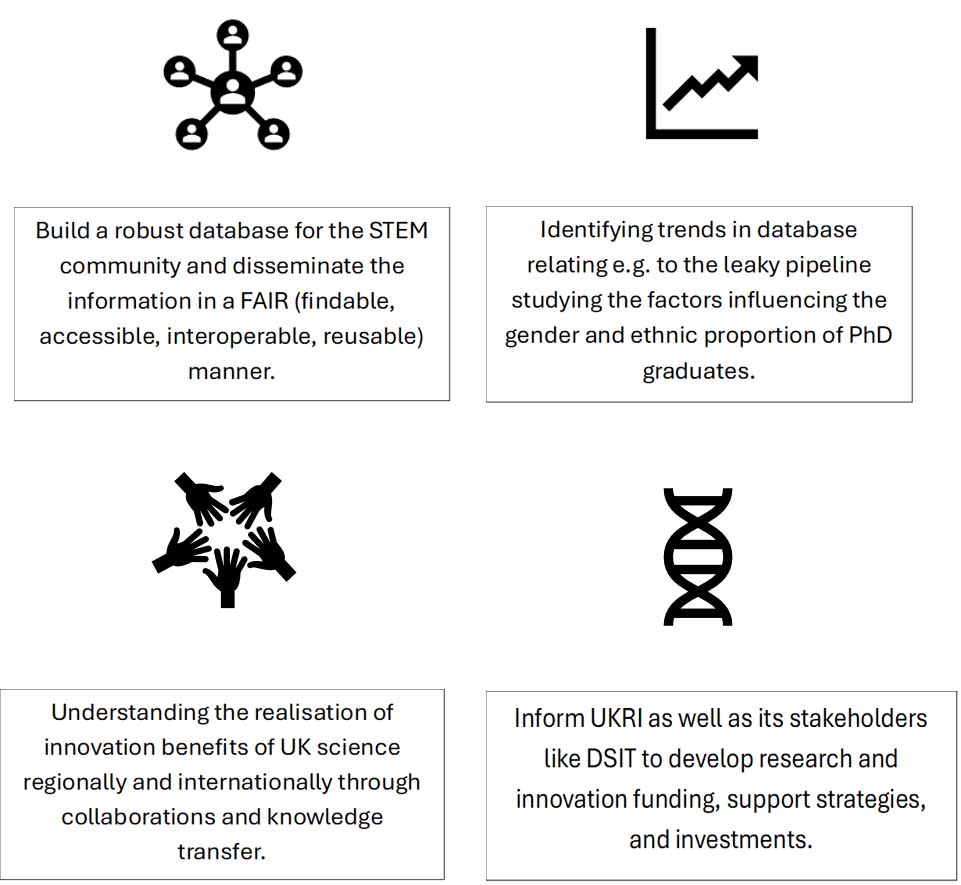UK Doctoral Graduates’ Contribution to Innovation (UK DGCI)
Find out about this pathbreaking research project led by the members of the Manchester Institute of Innovation Research.
Doctoral graduates are argued to present an important channel of knowledge transfer from science to industry. They are considered instrumental for scientific development and to substantially contribute towards social and economic progress.
However, there is a critical gap in the evidence base relating to the PhD population and their contributions especially in the UK.
Is there a way to overcome this gap by creating a database highlighting their direct and indirect contributions to inventions and subsequently to develop a framework to investigate barriers to innovation?
Project description
The UK DGCI project is principally funded by the European Patent Office (EPO) and Innovation & Research Caucus (IRC) and is primarily aimed at creating a longitudinal database of UK PhD graduates in Science, Technology, Engineering, Mathematics, and Medicine (STEMM) that enables the identification of their direct and indirect contribution to invention.
While the UK accounts for a comparatively low share of overall patent applications in Europe (approximately 2.9%, EPO) a high proportion of the research papers published in the UK is cited in patents (approximately 10%, Elsevier). A longitudinal database helps in estimating the extent to which STEMM graduates support invention through their innovative research.
The insights from this project will support the investigation of barriers to innovation along the pipeline including the leaks linked to gender biases as well as the constraints of economic growth in the UK.
Additionally, the project will allow identifying the areas where the innovation benefits of UK research are being realised and the impactful contribution of various scientific fields along with an analysis of new emerging fields such as Artificial Intelligence (AI).
Therefore, the database built during this project will establish a fundamental foundation for UK specific and comparative follow-on research.
How are we going to do this?
To execute this project, the methodology is adopted from DOC-TRACK*, a European wide effort to investigate the performances of PhDs and to create a new open European PhD database. UK DGCI is extending this idea to the case of the UK wherein it will rely on an Electronic Doctoral Theses (EDT) repository (EThOS) matched to publication and patent data for the creation of the database.
The DOC-TRACK project led by Catalina Martinez, commenced in September 2022 with a focus on matching information on the doctoral graduates of France, Germany, the Netherlands, and Spain to patent and scientific publication data. The resulting open database will enable comparative research on the careers and contributions of PhDs in Europe.
Research Impact:

Project Team
-

Cornelia Lawson
Professor
Alliance Manchester Business SchoolView research profile
-

Xin Deng
Lecturer
Alliance Manchester Business SchoolView research profile
-

Catalina Martinez
Tenured Scientist
CSIC-IPP
Institute of Public Goods and PoliciesView research profile
Contributing Members
-

Liangping Ding
Postdoctoral Research Associate
Alliance Manchester Business SchoolView research profile
-

An Yu Chen
Final Year PhD student, STIP PhD Programme (Science, Technology and Innovation Policy)
Alliance Manchester Business SchoolView research profile
-

Tiantian Shen
Third Year PhD student
Visiting PhD from Tongji University (Sep 23- Sep 24)View research profile
-

Bahaar Dahiya
Third Year BSc (Hons) International Business, Finance and Economics
Alliance Manchester Business SchoolView LinkedIn profile
-

Sanya Panda
Fourth Year MEarthSci Earth & Planetary Science with Industrial Experience (Geochem)
University of ManchesterView LinkedIn profile








